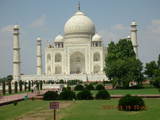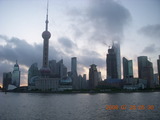

|
We have more megapixels, gigahertz, and terabytes than ever before, but deep in our hearts, we know something is really wrong. There is an unease in the United States of America these last few decades that is really new, something wicked this way comes. This stateside disease is affecting Asia and Europe, but I don't believe it has afflicted Asia and Europe. Both of these continents are more productive and wealthier than they were a few decades ago.
I'd like to go over the basics of economic productivity, truth inconvenient to those who seize power through economic zealotry. My earlier piece dealt with the inconvenient truth about ecological zealots. You know the story, "We have to help the poor, never mind who they are, so you have to give me power to help them." These are the subjects discussed in this essay:

|
The definition of "economics" therefore depends on the definitions of "scarce resources" and "distribution." Scarce resources are goods and services that have more people wanting them than naturally exist, basically things that people buy and sell. (We have to think for a minute to think of non-scarce resources, like air in the eighteenth century or food in the sub-Saharan Africa portrayed in the movie "The Gods Must Be Crazy.") Distribution is how those goods and services get from those who make them to those who use them. Usually makers and users are not the same people.

|
It's easy to picture economics being about money as it is the universal representation of things economic, and it's easy not to picture the underlying goods and services as being what the whole story is about.
These goods and services can be consumed or kept by their producers, taken by force, given away, or traded.
Self sufficiency isn't an option for most of us, forceful distribution is seldom a good option, and altruism isn't much better in the long run. So that leaves trade as our fundamental economic force.
Trade happens when I have something you want and you have something I want, we find out about each other, we decide on a mutually-agreeable exchange, and we follow our agreement in exchanging our goods and services. This works fine for direct exchange between two people at the same time.

|
When they become less specific in recipient, "Mr. Jones promises to deliver ten cords of wood to the bearer," these pieces of paper become money. After giving Mr. Jones something he needs, I can give this piece of paper to Mr. Brown for something I need and he can use the ten cords of wood from Mr. Jones.
The next steps are more subtle. We can have promises or for things to deliver at a later date as futures contracts and for things we don't plan to deliver as collateral for loans. Finally, we can have units of value not tied to a particular good or service. Mr. Jones agrees to ten cords of his wood being worth twenty credits and establishes his price as two credits per cord.
Once we have money in one form or another, we have a medium for trade without having to know each other. Leonard E. Read's 1958 essay "I Pencil" discusses how this happens with an impassioned plea not to let government bureaucrats and regulators mess it up.
I would be overly optimistic to argue that an informed community of price setters and buyers produces the maximum wealth and optimal distribution. However, when the free-market economy has been allowed to function it has done a good job of producing a lot of wealth and making sure that almost anybody willing to work and to produce something useful gets a piece of that pie.

|
There is a community of economic philosophers going back to the middle ages who say this free-market economy is a natural law, that leaving markets free will eventually gravitate to the greatest good. I don't believe this.
There is a tremendous social and political infrastructure required to have a free market. There are older, wiser, and better-educated people who have thought about these issues, so let me give a brief overview of what it takes to have the so-called Natural Law happen.
There are societies dominated by nature, neither religious nor political, that are neither productive nor free. Anybody who has spent time in central Africa can tell you how bad things are there. Everybody agrees there are just a couple of big things that need to change to save these people from their misery, but they just don't seem to agree on what those big things are. So let me make a suggestion.
To have a productive, free society, a place where most of us would really want to live, we need three things:
|
• Respect for life, liberty, property, and promises. • Respect for other people's religious choices. • Respect for other people's economic choices. |

|
A friend asked me why I thought it was so nice that I lived (at that time) in a place where people didn't lock their doors, where 80 hours per week of police coverage was enough. Because it means that community respects property, that it wouldn't occur to most people to take something that wasn't theirs, or at least to leave a note, "Pete, I borrowed your electric saw," signed "George."

|
While we're busy touting religious and economic freedom, let us not forget the first, foundation principle of respect for people, their lives and their property.
These are the principles upon which the United States of America was founded. I was embarrassed to hear two people living here in conversation where one said, "People who have those [conservative American] values should go somewhere and form their own country." They did, we did, and you're both here because you appreciate what those values produced. As we reject these founding values, our lives become less prosperous and less free.
Yes, it's true. Ideas have consequences.

|

|
I'd like to go over the fallacy of how we measure wealth, starting with an example.
Suppose a fashionable desert town (think of someplace near Sedona) has one hundred homes that sell for a million dollars on the market. We know that's their price because there's a steady flow of people buying and selling, maybe five a year, and the price is a million dollars. The total real-estate wealth of that community is easy to calculate:
| wealth = price × quantity |
| wealth = 100 houses × $1,000,000 |
| wealth = $100,000,000 |
Now there's a Big Fire, the horrible event everybody has been dreading, and twenty of those homes turn to ash surrounded by burnt cactus. The resulting eighty homes are now worth 1.5 million dollars because they're in high demand.
| wealth = price × quantity |
| wealth = 80 houses × $1,500,000 |
| wealth = $120,000,000 |

|
The actual answer is more complicated than that, and I don't have it all worked out, but only the 100th house is worth $1,000,000. The 99th house is worth a little more, what it would sell for if one house weren't there. The 98th house is worth even more, what it would sell for if two houses weren't there. Whatever measure you want to use for wealth should include the incremental values added up over the inventory being assessed.
So when somebody says the market capitalization of a company is the stock price times the number of shares, I don't believe it. I don't know what to believe, but that isn't it. In the last year or so, they tell me America's credit market has lost $500 G. (For big-bucks numbers, $1 K = $1000 = one thousand, $1 M = $1000 K = one million, $1 G = $1000 M, and $1 T = $1000 G.) Europe lost another $500 G for a total loss of $1 T, a terabuck.
This might be taking the covers off an erosion of wealth that has been going on for decades or it might be a phantom response to a comparatively small change. In either case, we didn't wake up one morning and find ourselves $1 T, a terabuck, poorer.

|
This is wrong on many levels. First, stocks respond to the performance and health of a company. It takes more than a few hours, more like a few years, for a decision, even a really good decision, to change the financial performance of a large company. Second, do we expect individual good decisions to make perceptible changes on something as long-term as a stock price? Should one evaluate a home-cleaning service by having the house appraised before and after? Third, he's got it backwards. Wall Street investors buy and sell stock, they don't run companies. So why is this executive relying on those investors for approval of his corporate decisions? He's supposed to be the expert in his company (another discussion to be had about the millennial wave of inept American CEOs), not following the people who are trying to follow him. There's some circular reasoning in there.
So here's the clincher:
THE UNITED STATES IS A LOT POORER THAN IT WAS FORTY YEARS AGO.
The economic pundits tell us things are great here in the U.S.-of-A, but our personal experience keeps telling us differently. We have big-screen plasma TVs with 500 cable channels and just think what that would have cost in 1968. How can we compare then and now anyway? It's apples and oranges.

|
So what about computers and cell phones and big-screen plasma TVs? We have more megapixels, gigahertz, and terabytes than ever before, but we should use more basic measures of wealth.
There are two flies in the we're-a-lot-poorer-argument ointment. Communication and air travel are both a lot cheaper. These are almost necessities in 1968 and 2008, things Americans would miss meals to have then and now. I don't think either is cheap enough or important enough to displace the higher costs of the bottom-line necessities, but we should consider them.
In light of our failings in necessities, I don't think it's that interesting how much nicer "CSI Miami" is than "The Ed Sullivan Show" or how much better "Jeopardy!" is in high definition than in black-and-white when the questions were harder. (For Smothers Brothers fans, Pat Paulson for President is looking pretty good these days.) Cars are more fun today, even with those silly air bags, but where can we drive them with all the traffic jams of people driving to jobs they hate?

|
So what rights do we have and what rights should we have?
Let me put it this way. A lot of people before our time took a lot of risks and shed a lot of blood so we could hold these truths to be self-evident, that all men are created equal, that they are endowed by their Creator with certain unalienable rights that among these are Life, Liberty and the pursuit of Happiness. If we have to fight horrible, bloody wars to defend these truths, then maybe they are not as self-evident as we thought they were. Yet we need to live in a society where they are self-evident to enjoy the kind of lives most of us want to live.

|
One of the disturbing trends in the United States over the last half century is the growing community of non-productive whiners articulating their entitlement to a share of the pie. Never mind the exact accounting, finding something useful you can do should be a prerequisite for getting something from the rest of us. This has become a racial issue here: "Howcum all these hard-working immigrants are getting ahead while we're still stuck on welfare-relief in the slums?"
I'm old-fashioned enough to like the things wealth provides me. I want to have a nice place to live, no bugs, warm in the winter, cool in the summer, two cats in the yard, safe neighborhood, good schools, nice weather, free from crime, and all that stuff. I like having an automobile and driving it where I want to go with gasoline in the tank. In my own case, I like having an airplane and flying it on my weekend outings. I like having airlines take me to various places on this planet. I like having good food to eat and medicine when I'm not well.
Since I can't make these things, I need somebody else to provide them. I'm comfortable with the notion that I have to provide these people with something I can make. Maybe there are a few intermediary parties, maybe more than a few intermediary parties, but eventually what I produce has to be enough to pay for the effort to make my home and car and travel and food and health care.
I had a friend who worked in my profession for the government. He complained once that private-sector engineers were paid more than government engineers. "In other words," I told him, "you're complaining that I get more of my paycheque than you do." A famous-within-his-field analyst named Gene Woolsey said it was important to train a generation of productive students "so the socialists will have someone to tax."

|
The division between producers and moochers has sprawled into social issues where it has no business. Racial issues from urban gentile ghettos to affirmative action ultimately boil down to who are earning the wealth and who feel entitled to consuming it without earning any of it.
A free society doesn't mean you get to live your life for free. As miserable as it sounds, if you do nothing, then you should get nothing. Sure there are horrible cases like blind people and cripples who can't work, but they're not the problem we're having in the United States. It's the rest of the able-bodied, disabled-by-television-minded cases who need to get off their high horses and on the job market.

|
Now things are breaking all over the place. The cost of Microsoft's shifting sands (Have you seen Vista yet?) is enormous. I don't blame Microsoft any more than I blame Katrina, we didn't have to build a major city without protection in hurricane country and we didn't have to base our businesses on bad software.
So how does software fit in a discussion of wealth and productivity? Simply this: The humongous post-modern software-programming enterprise pays (my off-the-cuff guess) ten million people quite well but doesn't produce very much, if anything. If you're part of that scene, then you're probably not part of the productive scene that is needed to dig our world economy out of its current hole.

|
I believe the software industry is doing more harm than that. Have you seen the movie "Brazil"? There's a culture today that nothing works and nothing is really supposed to work. In 1981 I sent a friend in Massachusetts an e-mail from California. I gave him a time and place I was going to be in New York City. I didn't need or expect a reply because I knew either he would get the e-mail or I would get a notification. Today we confirm our confirmations and still we worry.
When my friend's car jumped into an intersection at a red light because he pressed the DEFROST button, that shocked us in 1985. Those who are reading this in 2008 should ask yourselves, does this shock you in 2008? I didn't think so.
So what is the Software Event Horizon? I take this from the Douglas Adams trilogy "The Hitchhiker's Guide to the Galaxy" where he describes, tongue in cheek, a planet where shoes got so bad that people needed more and more shoes that wore out more and more quickly until the entire planet was consumed making shoes. He called this the "Shoe Event Horizon." Can the 7000 million people on our planet ever produce enough software to fix the problems in the computers we run today?

|
I'm not suggesting we get rid of our computers, never mind that I enjoy driving a manual-everything 1987 car and fly a manual-everything 1967 airplane. I'm suggesting we expect fewer bells and whistles from our software and emphasize getting the right answers right away from our software vendors.
If some software doesn't help somebody make a better decision or run a better enterprise or make something work better, then why are you buying it? I know it looks pretty, but lots of things look pretty and I don't buy them. You shouldn't buy them either.
|
15:37:09 Mountain Standard Time (MST). 109 visits to this web page. |